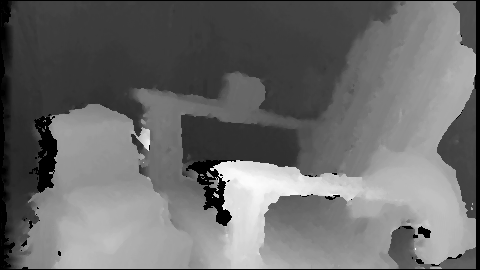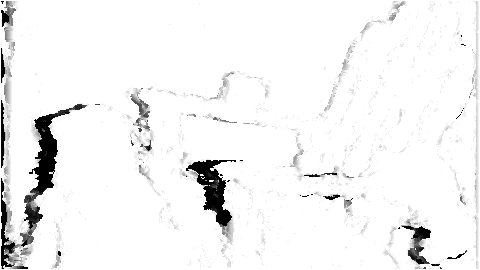Overview
Given a pair of rectified images from a stereo camera, the Stereo Disparity algorithm uses high-quality dense stereo matching to produce an output image of the same resolution as the input with left-right disparity information. This allows for inferring the depth of the scene captured by the left and right images.
| Left image | Right image |
|---|---|
 |  |
| Disparity map | Confidence map |
 |  |
Implementation
The stereo disparity estimator uses semi-global matching algorithm to compute the disparity. We deviate from the original algorithm by using as cost function the hamming distance of the census transforms of the stereo pair.
Usage
Language:- Import VPI module import vpi
- Estimate the disparity between left and right input VPI images, using 5x5 window and 64 maximum disparity. Optionally, the resulting disparity image is converted to U8, with range [0,255], suited for display. with vpi.Backend.CUDA:output = vpi.stereodisp(left, right, window=5, maxdisp=64) \.convert(vpi.Format.U8, scale=1.0/(32*64)*255)
- Initialization phase
- Include the header that defines the needed functions and structures. ColorImageFormat algorithm will be needed to process the disparity output for display. #include <vpi/algo/ConvertImageFormat.h>#include <vpi/algo/StereoDisparity.h>Declares functions that handle image format conversion.Declares functions that implement stereo disparity estimation algorithms.
- Define the input rectified stereo pair.
- Create the output disparity and confidence images, and the image used for disparity display (optional). int32_t w, h;vpiImageGetSize(left, &w, &h);VPIImage disparity;vpiImageCreate(w, h, VPI_IMAGE_FORMAT_U16, 0, &disparity);VPIImage confidence;vpiImageCreate(w, h, VPI_IMAGE_FORMAT_U16, 0, &confidence);VPIImage display;vpiImageCreate(w, h, VPI_IMAGE_FORMAT_U8, 0, &display);@ VPI_IMAGE_FORMAT_U16Single plane with one 16-bit unsigned integer channel.Definition: ImageFormat.h:110@ VPI_IMAGE_FORMAT_U8Single plane with one 8-bit unsigned integer channel.Definition: ImageFormat.h:104VPIStatus vpiImageCreate(int32_t width, int32_t height, VPIImageFormat fmt, uint32_t flags, VPIImage *img)Create an empty image instance with the specified flags.VPIStatus vpiImageGetSize(VPIImage img, int32_t *width, int32_t *height)Get the image size in pixels.
- Create the payload that will contain all temporary buffers needed for processing. It'll be created on the CUDA backend. VPIPayload stereo;VPIStatus vpiCreateStereoDisparityEstimator(uint32_t backends, int32_t imageWidth, int32_t imageHeight, VPIImageFormat inputFormat, const VPIStereoDisparityEstimatorCreationParams *params, VPIPayload *payload)Creates payload for vpiSubmitStereoDisparityEstimator.
- Create the stream where the algorithm will be submitted for execution. VPIStream stream;vpiStreamCreate(0, &stream);VPIStatus vpiStreamCreate(uint32_t flags, VPIStream *stream)Create a stream instance.
- Include the header that defines the needed functions and structures. ColorImageFormat algorithm will be needed to process the disparity output for display.
- Processing phase
- Define the configuration parameters needed for algorithm execution. params.windowSize = 5;params.maxDisparity = 64;int32_t windowSizeWidth of Census Transform window for disparity features.Definition: StereoDisparity.h:135Structure that defines the parameters for vpiSubmitStereoDisparityEstimator.Definition: StereoDisparity.h:134
- Submit the payload for execution on the backend associated with it. vpiSubmitStereoDisparityEstimator(stream, VPI_BACKEND_CUDA, stereo, left, right, disparity, confidence, ¶ms);VPIStatus vpiSubmitStereoDisparityEstimator(VPIStream stream, uint32_t backend, VPIPayload payload, VPIImage left, VPIImage right, VPIImage disparity, VPIImage confidenceMap, const VPIStereoDisparityEstimatorParams *params)Runs stereo processing on a pair of images and outputs a disparity map.
- Optionally, the resulting disparity image can be converted to U8 format and the disparity values are rescaled to fit in [0,255] range, suited for display. VPIConvertImageFormatParams cvtParams;vpiInitConvertImageFormatParams(&cvtParams);cvtParams.scale = 1.0f / (32 * params.maxDisparity) * 255;vpiSubmitConvertImageFormat(stream, VPI_BACKEND_CUDA, disparity, display, &cvtParams);VPIStatus vpiSubmitConvertImageFormat(VPIStream stream, uint32_t backend, VPIImage input, VPIImage output, const VPIConvertImageFormatParams *params)Converts the image contents to the desired format, with optional scaling and offset.VPIStatus vpiInitConvertImageFormatParams(VPIConvertImageFormatParams *params)Initialize VPIConvertImageFormatParams with default values.Parameters for customizing image format conversion.Definition: ConvertImageFormat.h:85
- Wait until the processing is done. vpiStreamSync(stream);VPIStatus vpiStreamSync(VPIStream stream)Blocks the calling thread until all submitted commands in this stream queue are done (queue is empty)...
- Define the configuration parameters needed for algorithm execution.
- Cleanup phase
- Free resources held by the stream, the payload and the input and ouput images. vpiStreamDestroy(stream);vpiPayloadDestroy(stereo);vpiImageDestroy(left);vpiImageDestroy(right);vpiImageDestroy(display);vpiImageDestroy(disparity);vpiImageDestroy(confidence);void vpiPayloadDestroy(VPIPayload payload)Deallocates the payload object and all associated resources.void vpiStreamDestroy(VPIStream stream)Destroy a stream instance and deallocate all HW resources.
- Free resources held by the stream, the payload and the input and ouput images.
Consult the Stereo Disparity Sample for a complete example.
For more information, see Stereo Disparity Estimator in the "API Reference" section of VPI - Vision Programming Interface.
Limitations and Constraints
Constraints for specific backends superceed the ones specified for all backends.
All Backends
- Left and right input images must have same type and dimensions.
- Output image dimensions must match input's.
- Output disparity and confidence images must have format VPI_IMAGE_FORMAT_U16.
- Maximum disparity parameter passed to algorithm submission must be the same as defined during payload creation.
- Input image dimensions must match what is defined during payload creation.
CUDA and CPU
- Accepted Left and right input image formats:
- downscale factor limited to 1, meaning output has same dimensions as input
- (CPU only) confidence map output must be NULL, maxDisparity is limited to 64.
- (CUDA only) maxDisparity is limited to 256.
PVA
- Only available on Jetson Xavier devices.
- Left and right accepted input image types:
- Input and output image dimensions must be 480x270.
- windowSize must be 5.
- maxDisparity must be 64.
- downscaleFactor limited to 1, meaning output has same dimensions as input
- confidence map output must be NULL
PVA+NVENC+VIC
- Accepted Left and right input image formats:
- Input and output image dimensions must be 1920x1080
- maxDisparity is limited to 256
- downscale factor can be either 1 or 4 (for 480x270 outputs)
VIC
- Not implemented.
Performance
For information on how to use the performance table below, see Algorithm Performance Tables.
Before comparing measurements, consult Comparing Algorithm Elapsed Times.
For further information on how performance was benchmarked, see Performance Benchmark.
References
- Hirschmüller, Heiko (2005). "Accurate and efficient stereo processing by semi-global matching and mutual information".
IEEE Conference on Computer Vision and Pattern Recognition. pp. 807–814. - Zabih, Ramin; Woodfill, John (1994). "Non-parametric local transforms for computing visual correspondence".
European conference on computer vision. pp. 151–158.